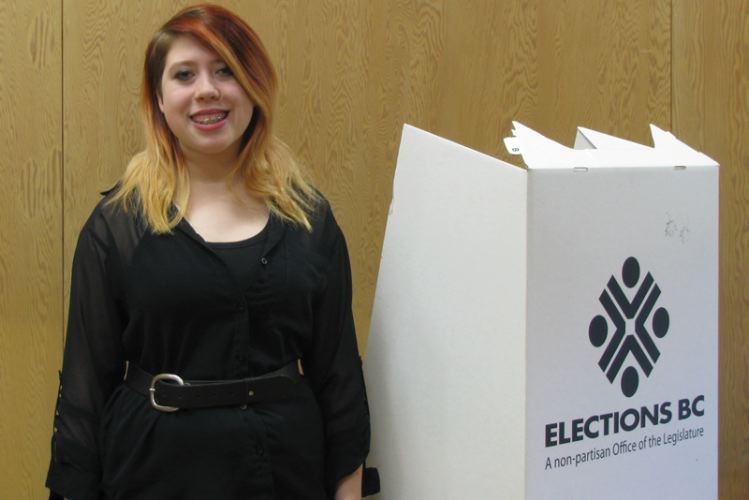Grade 9 student Neyve Eggar is used to talking politics.
Her mother teaches political science at the university and dinner conversation can sometimes delve into topics covering issues usually reserved for the classroom.
But the Prince George Secondary School student is getting even more than her usual dose of civic engagement - this time through a cross-Canada program offered at her school that seeks to increase youth involvement in the political process.
Student Vote provides resources to teachers so students like Eggar can learn about candidates, their platforms and how municipal governments function. They even experience voting day, complete with a voting clerk and scrutineer and even place faux-ballots in an Election B.C.-style voting box
"You feel like you're actually a part of what you're learning," said Eggar, who sits on the library's youth advisory board. Now, when she goes to council meetings, she recognizes councillors, putting voices and faces to the headshots plastered on signs that litter sidewalks and grassy patches across the city.
"I think it's so great that we're doing this. Lots of kids don't actively have an interest in politics, so the kids that do that can kind of be an anomaly because there are so few of us," said Eggar, who said she has changed her political views over the years as she has learned more.
"So it's fascinating when people come up to you and say 'That was interesting' and you're like, 'Yes, it is," she laughed, emphasizing the last word. "Because if you look deeper it's really interesting but it's when people can't look deeper yet - or not can't but just don't know how, don't have the capacity."
Added Eggar's teacher Michelle Scott, "Or maybe hasn't been made relevant, I think, to them. This helps make it relevant to them."
PGSS is one of more than 380 schools in the province that are expected to take part in a parallel municipal vote this week. Five other schools in Prince George will also hold votes on Nov. 13 and 14 ahead of Saturday's election day, including DP Todd secondary school and Ron Brent, Peden Hill, Heather Park and Foothills elementary schools.
As part of her Student Vote curriculum, Scott brought in Eggar's mother Tracy Summerville to answer questions, as well as incumbent councillor Garth Frizzell. But a questionnaire that helps students place themselves on the political spectrum was most interesting - putting friends, who often see themselves as similar, on opposite ends of the spectrum.
"They learn a ton and it's very relevant because it's conversations at home with their families because it's current and it's in the news," said Scott, who is the Montessori teacher at PGSS. "I think it makes it more engaging for them because it's like real-life."
Scott said it's important the organization tallies up the results - that way students feel like they are being heard.
"It's not a voice that should be discounted because they are smart young people and they will very soon, in the next election, be voting," she said.
Peden Hill Elementary teacher Terri Reed said tackling the subject of municipal politics during an election is a unique learning opportunity.
"Government is one of the hardest subjects to teach because it's so arbitrary for them. This way they can actually feel like they have [a say]. It makes it concrete," Reed said, adding she plans on discussing recreational facilities and services to help students understand the role elected city officials play in their daily life.
"I want them to start looking around their community and say I really wish we had this. How can we get that and do you think it's feasible?" said Reed, who teaches Grade 6 and 7.
That way, they can better understand the role of mayor and council, and hopefully identify areas that matter to youth, she said.
While both Reed and Scott hope pretending to vote now will translate to practice when their students reach voting age, Eggar said it has an impact.
"If we're informed now, when we get to university we're not going to have to think about it," Eggar said. "We're going to know who we agree with and even if the candidates change, we're going to know how to access the information to find out who we agree with."



